INTRODUCTION:
Definition of Bio-medical Waste:
“Bio-medical waste" means any waste, which is generated during the diagnosis, treatment or immunization of human beings or animals or research activities pertaining thereto or in the production or testing of biological or in health camps.
The Bio-medical Waste Management rules are applicable to all persons who generate, collect, receive, store, transport, treat, dispose, or handle bio medical waste in any form.
Bio-Medical Waste rules 2016 doesn’t apply to the following types of wastes as they are covered under different acts enumerated below:
• Radioactive wastes
• Hazardous chemicals
• Lead acid batteries
• Hazardous wastes
• E-Waste
• Municipal Solid Wastes
• Hazardous microorganisms, genetically engineered microorganisms and cells
As per the act passed by the Ministry of Environment and Forests in 1986 & notified the Bio Medical Waste (Management and Handling) Rules in July 1998, it is the duty of every “occupier”, i.e. a person who has the control over the institution or its premises, to take all steps to ensure that waste generated is handled without any adverse effect to human health and environment.
The biomedical waste management policy followed at Dr. B. R. Ambedkar Medical College is as per the Biomedical Waste Management Rules 2016, notified by the Ministry of Environment, Forest and Climate Change, Government of India as per the gazette notification dated 28th March 2016.
BMW MANAGEMENT RULES 2016:
Biomedical Waste Management Rules 2016, Amended 2018 (DOWNLOAD PDF)
Biomedical Waste Management Rules, 2016
SALIENT FEATURES:
The major salient features of BMW Management Rules, 2016 include the following:-
(a) The scope of the rules has been expanded to include vaccination camps, blood donation camps, surgical camps or any other healthcare activity;
(b) Phase-out the use of chlorinated plastic bags, gloves and blood bags within two years;
(c) Pre-treatment of the laboratory waste, microbiological waste, blood samples and blood bags through disinfection orsterilization on-site in the manner as prescribed by WHOor NACO;
(d) Provide training to all its health care workers and immunize all health workers regularly;
(e) Establish a Bar-Code System for bags or containers containing bio-medical waste for disposal;
(f) Report major accidents;
(g) The new rules prescribe more stringent standards for incinerator to reduce the emission of pollutants in environment;
(h) Existing incinerators to achieve the standards for retention time in secondary chamber and Dioxin and Furans within two years;
(i) Bio-medical waste has been classified in to 4 categories instead of 10 to improve the segregation of waste at source;
(j) Procedure to get authorization simplified. Automatic authorization for bedded hospitals. The validity of authorization synchronized with validity of consent orders for Bedded HCFs. One time Authorization for Non-bedded HCFs;
(k) No occupier shall establish on-site treatment and disposal facility, if a service of `common bio-medical waste treatment facility is available at distance of seventy-five kilometers.
(l) Operator of a common bio-medical waste treatment
and disposal facility to ensure the timely collection of bio-medical waste from
the HCFs and assist the HCFs in conduct of training.
MODE OF DISPOSAL BMW (Through CBWTF)
Name and Address
of CBWTF:
Medicare
Environmental Management PVt. Ltd.
(Formerly
SembRamky Environmental Management PVt. Ltd.)
Ramky House,
site No 25-30, 2nd cross, Raghavendranagar,
Hennur Ring Road, Kalyan Nagar, Bengaluru – 560043.
PHOTO GALLERY
Temporary storage area of BMW

Temporary Storage Area of BMW

Spill Management of BMW

Segregation of BMW

Training BMWM

